- About
- Membership
- Resources
- Awards
- Events
- Get Involved

We congratulate the 2020 NABT Teaching Award Recipients and are honored to recognize their achievements.
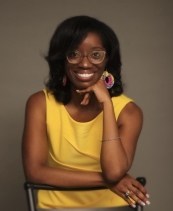
Adronisha Frazier
Louisiana States University, Baton Rouge, LA
Biography
Adronisha Frazier is currently a doctoral student at Louisiana State University (LSU) while working full-time as a Biology Instructor at Northshore Technical Community College. In 2017, she earned an Outstanding Adjunct Instructor Award as a first-year faculty member at Northshore. She is also the 2020 - 2021 President’s Faculty Fellowship Award Recipient for the Louisiana Community and Technical College System. She holds bachelor's and master's degrees in Biology from Southeastern Louisiana University. She is pursuing a doctoral degree in curriculum and instruction with a focus in science education at LSU. She has taught at Southeastern Louisiana University as a teaching assistant, Houston Community College as a biology instructor, YES Prep Public Schools as a chemistry teacher, and worked with high school students in university Upward Bound programs. She is interested in creating and implementing engaging STEM content for secondary and higher education, enhancing interest in microbiology education through hands-on learning, and implementing real-life situations in all biology courses and activities. She is currently creating and implementing Open Educational Resource (OER) content for higher education with recent publication of PowerPoint Presentation slides for OpenStax’s Microbiology textbook in Affordable Learning LOUISiana. She recently published a non-peer reviewed opinion editorial in the Association for Science Teacher Education (ASTE) regarding an interactive lesson study session. She is honored to serve as the 2020 NABT Biology Educator Leadership Scholarship Awardee.
Personal Statement
I have experience teaching at the high school, community college, and university levels. I strive to deliver content to my students in a way that is engaging and meaningful to their daily life. I crave bringing this interest to the world around me through research. I desire to be a Science Content Creator for secondary and post-secondary education and a distinguished Community College and University Professor teaching biology and science education courses. As an educator, I believe it is my job to engage my students by reaching them where they are and helping them get to where they need to be.
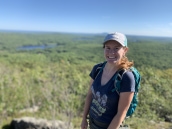
Tara Alcorn
Greater Lowell Technical High School, Tyngsborough, MA
Biography
Dr. Tara Alcorn has been teaching science at Greater Lowell Technical High School for twelve years. Her passion is to help students discover the magic of nature in the world around them through agriculture and citizen science. If you were to visit Tara’s class, you would be whisked outside to track animal tracks in the snow, tap maple trees to make “Gryphon Syrup,” or measure new growth of hemlock trees in an attempt to understand the impact of the hemlock woolly adelgid.
Tara earned her bachelor’s degree in biology from Clark University, a Master’s of Education and a Doctorate in Education with a concentration in STEM from the University of Massachusetts, Lowell. Her thesis, “Woolly Bully: Exploring High School Students’ Science Identities and Attitudes in the Context of a Citizen Science Project” unearthed promising gains in science performance as well as enhanced science identities for female students who participated in the Harvard Forests’ hemlock woolly adelgid schoolyard science project and Zoo New England’s wood turtle head start program.
In addition to teaching, Tara serves as a member of the Dunstable Conservation Commission and the Nashua River Wild and Scenic River Stewardship Council. She is a 2014 Earthwatch Fellow, where she participated in field research at the Yanayuca Biological Station in Cosanga, Ecuador. Currently, she is finishing a Research Experience for Teachers through the Harvard Forest, where she studied long-term changes to forest ecosystems using the New England Landscapes Futures Explorer and other GIS tools with the Thompson lab. Tara enjoys gardening and hiking with her husband, Paul.
Personal Statement
As an environmental science educator, it is my mission to open people’s eyes to the wild, wonderful world that awaits them in their own neighborhoods. Through my work as a science educator, I have found that both adults and teenagers are unaware of their local environment. Most people can hardly distinguish an oak from a maple. While students can discuss threats facing tigers and pandas, they are unable to name an endangered species that is native to Massachusetts. They can rattle off the names of invasive species, including pythons in the Everglades and lionfish in the Caribbean, but cannot point out the Asian bittersweet that is choking out the weeping willow by the student parking lot.
One of my main goals is to find ways to integrate environmental justice into my curriculum. I am honored to work with students from diverse backgrounds. Lowell is a sanctuary city with a vibrant Southeast Asian community made up of families who fled from the Cambodian genocide and Laos’ Secret War. It is also home to many Latinx students whose families hail from places such as Puerto Rico, Colombia, and the Dominican Republic. I have realized that I look at environmental issues through a lens of white privilege, and I am trying to calibrate my view by learning as much as I can about the struggles my students face as underrepresented minorities. This summer, I have spent time learning about the intersectional environmental movement, which is an inclusive version of environmentalism that advocates for both social justice for people and protection for the planet.
Being a teacher in 2020 is a lot like being a colony of E. coli on an agar plate in an antibiotic resistance lab. In order to survive these challenging and uncertain times, we need to conduct some horizontal gene transfer to get each other through remote, hybrid, and full in-person learning whole and sane. The gene I would like to transfer to my fellow educators is this: do not be afraid to bring your class outdoors. There’s a whole world of phenomena waiting for you right by the bus stop.
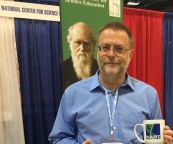
Glenn Branch
National Center for Science Education, Oakland, CA
Biography
Glenn Branch is deputy director of the National Center for Science Education, a non-profit organization that works at the local, state, and national levels to ensure that socially but not scientifically controversially topics, such as evolution and climate change, are taught accurately, honestly, and confidently. In his twenty-plus years at NCSE, he was involved in defending evolution education against attacks small and large, personally aiding hundreds of individual biology teachers facing challenges to the teaching of evolution in their classrooms, schools, and districts. He worked on the Kitzmiller v. Dover case, in which the unconstitutionality of teaching “intelligent design” creationism in the public schools was established, in 2005; more recently, he was involved in the fight for a proper treatment of evolution in the state science standards of New Mexico in 2017, the effort to stop a 2017 bill in South Dakota that would allow teachers to misrepresent evolution as scientifically controversial, and the struggle for a proper treatment of evolution in the state science standards in Arizona in 2018. He is also a prolific writer, whose publications include Not in Our Classrooms: Why Intelligent Design is Wrong for Our Schools (coedited with Eugenie C. Scott, 2006), a dozen or so essays for Evolution: Education and Outreach under the collective title “Overcoming Obstacles to Evolution Education,” four columns and five reviews for The American Biology Teacher, and a recent report (with Eric Plutzer and Ann Reid) on the state of evolution in high school biology in Evolution: Education and Outreach.
Personal Statement
For the last twenty years, I have been working at the National Center for Science Education to defend the integrity of science education against ideological attacks particularly, evolution education against creationist attacks I hardly would have devoted so much of my career to the cause if I didn’t think that evolution education was important! Dobzhansky’s maxim that nothing in biology makes sense except in the light of evolution emblazoned on a treasured T-shirt of mine is a constant guide. And, although I am not myself a biology instructor, I regard it as a privilege as well as a pleasure that my job involves supporting educators in teaching evolution.
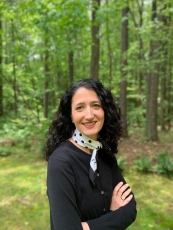
Kelly Hogan
University of North Carolina, Chapel Hill, NC
Biography
I am a Teaching Professor of Biology, Associate Dean of Instructional Innovation, and the Quality Enhancement Plan Director for the University of North Carolina at Chapel Hill. Since 2004, I have been teaching 400-seat introductory biology classes, using interactive teaching methods and technologies. By demonstrating the effectiveness of my methods in large lecture classes to promote equity, I’ve been honored to receive national attention in publications such as The New York Times, The Atlantic and The Chronicle of Higher Education. My teaching has also impacted students far beyond those in my classroom, as the co-author of an introductory biology textbook (Campbell Biology’s Concepts and Connections). A highlight of my career was being asked to be the commencement speaker for UNC-Chapel Hill in 2015, in which I couldn’t resist modeling ideas with a classroom response system with an audience of more than 7,000.
I enjoy working with educators, locally and nationally, in workshops and learning communities centered around course-based undergraduate research experiences (CUREs), makerspace courses, and other evidence-based curricular strategies. Recently, I teamed up with my colleague, Dr. Viji Sathy, running workshops around the country and writing about inclusive pedagogy (inclusifiED.com).
I completed my BS in biology at The College of New Jersey in Ewing, New Jersey (B.S. 1996) and earned my doctorate in Pathology and Lab Medicine from UNC-Chapel Hill (Ph.D. 2001).
Personal Statement
My goal is to ensure that all students feel welcomed and a sense of belonging in my introductory courses, which in turn, helps retain more students in STEM. The diversity of our students is a strength to be harnessed, and I’m always saddened when I hear people use terms like “weed out courses”. I believe that with the right practice, all students can succeed. As such, I am always looking for ways I can bring an equity mindset to my course design and teaching strategies. As much as I enjoy interacting with students, I also enjoy designing curriculum that brings authentic research-thinking skills to students, encourages collaborative problem-solving, and works to dispel misconceptions in biology.
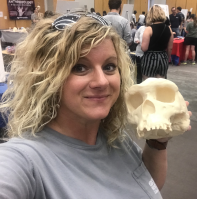
Amanda Glaze-Crampes
Georgia Southern University, Statesboro, GA
Amanda Glaze-Crampes specializes in science teacher education, evolution education research and outreach, and professional development, alternating her time between the classroom and the field as an Assistant Professor of Middle Grades & Secondary Science Education at Georgia Southern University. Her research centers on the intersections of science and society, specifically the acceptance and rejection of evolution in the Southeastern United States and the impact of the conflict between religion and evolution on science literacy. Her work has been featured on NPR's video/radio series Science Friday as well as on social media outlets such as the NCSE Science Education Blog, ErrantScience.com, and RealScientists.org. She served as an expert panelist for Science Friday's education focus #TeachTheE and works with organizations including NCSE, the Smithsonian Human Origins Program and National Geographic funded Umsuka project at the Cradle of Humankind in South Africa. Her research has been referenced in mainstream media outlets such as Scientific American, Forbes, and Newsweek and can be found in Science Education, The American Biology Teacher, Education Sciences, the International Journal of Mathematics & Science Education, and others.
Personal Statement
The philosophy I embody in teaching is rooted in my experiences as a student, teacher, and teacher educator. My practice is grounded in an overwhelming passion for learning that comes from a lifetime of turning experience into knowledge. I loved science as a child, growing up between two farms and in a setting where I was never separated from others by age, gender, or ability. I could do anything, ask questions, and explore freely, and it was the most powerful feeling I can describe. As a result of later challenges I faced, my teaching philosophy centers around empowering others by fostering that support and providing opportunities to grow in ways they might not yet be able to see. My science experiences in school were mostly underwhelming, except for one, my last high school anatomy class, which was the only class in which I got to "do" science. Engaging in science while seeing yourself as a scientist (rather than a bystander) is why the concept of "hands-on, minds-on" learning is such a massive part of who I am as a teacher. These experiences have led me to value discovery learning in the context of scientific practices and to create opportunities in my classroom for students to have similar experiences. I care deeply about my students, not just as bodies on a roster, but as people who I hope to inspire to do things they did not see themselves doing, to never be satiated by what they know, to question always and push the envelope to grow and become more--more effective teachers, more active voices, more open to the world that is possible. My role as a teacher is not to give them answers, tell them what to do, or how to think. I see my role as a person who is imperfect but curious and on a journey of exploration with them. I am here to orchestrate experiences that push them, ask questions that shift their thinking, and help them create new lenses through which to view the world, themselves, their future students, and the subjects they love.
Elizabeth Forrester
Baylor School, Chattanooga, TN
Biography
Dr. Elizabeth Forrester received her BS in Chemistry from the University of Tennessee- Chattanooga and Ph.D. in Cancer Biology from Vanderbilt University. Her teaching career at the secondary school level began with an emergency call to fill in for a teacher on medical leave. Dismayed by the discrepancy between science education and the scientific profession, Dr. Forrester has worked tirelessly to bridge the gap and carve out opportunities for students to participate in novel scientific research, particularly in the field of molecular genetics. The advanced instrumentation acquired for student research was recently repurposed to meet the COVID-19 testing needs in Tennessee. In March of 2020, the high school research lab was converted into a COVID19 testing lab and leased by Hamilton Co, TN Department of Health. Since this time, the lab has grown into Baylor Esoteric + Molecular Lab. To date, the lab has conducted over 57,000 COVID-19 tests and continues to serve area hospitals and clinics, in addition to offering surveillance testing for area schools and universities. Dr. Forrester currently serves and the Technical Director of Baylor Esoteric + Molecular Lab.
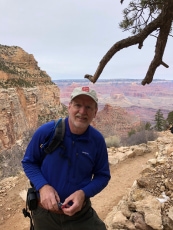
Bob Melton
Putnam City Schools (retired), Oklahoma City, OK
Biography
Bob Melton retired from Putnam City Schools in 2017 where he last served as the Assessment Coordinator. He began as a biology teacher at Putnam City West High School in 1973 and was the Science Curriculum Coordinator for Putnam City Schools from 1993 to 2013.
He currently serves as state director of the Oklahoma Science Olympiad, a program sponsored by the College of Math and Science at the University of Central Oklahoma where he also adjuncts, teaching secondary science methods to pre-service teachers.
During his career as a public school educator, he was named Putnam City Schools District Teacher of the Year, received the OBTA in 1989 and the Presidential Award for Excellence in Mathematics and Science Teaching in 1993. He was also awarded an APS fellowship and was an Access Excellence fellow. He is a Teacher/Consultant with the Oklahoma Writing Project, served many years on the Board of the Oklahoma Science Teachers Association, and is on the Board of Governors of Oklahomans for Excellence in Science Education.
Bob has long-term relationship with NABT. A member for most of his working life, he has served on and sometimes chaired several of the association’s committees, held office as the Oklahoma OBTA Director, the Oklahoma’s NABT Representative, the Region VII Coordinator, Director-at-Large on the NABT Board, the Association’s Secretary-Treasurer, and served as NABT President in 2016. He is currently Nominations committee chair and works on assorted NABT projects, such as the social media team.
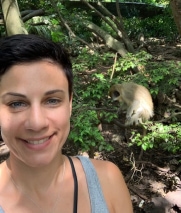
Nicole Werner
Interboro High School, Prospect Park, PA
Biography
I received my undergraduate degree from West Chester University of Pennsylvania and my masters degree from Cabrini University. While at West Chester University, I was able to take part in a research trip to the Tambopata Research Center in the Amazon Rainforest of Peru. It was there that I realized my passion for ecology. I have been teaching AP Biology for the past 3 years and General Biology for the past 14 years at Interboro High School. I have co-written grants to give my students access to technology and lab equipment in the classroom. Due to receiving these grants, my students have full access to Vernier probeware, laptops, and an incubator in my classroom. Outside of the classroom, I am the curriculum coordinator for the science department, I have coached girls track and field for the past 10 years, advised the class of 2017 for their 4 years of high school, and co-created a Women in STEM guest speaker series.
I believe that all students should have access to hands-on biology classes and real world biology experience. Biology isn't learned from a textbook, it is learned by experiencing labs and collecting and analyzing data. Science and teaching are both ever changing fields and it is important that I keep up to date in both areas to give my students the best education possible.
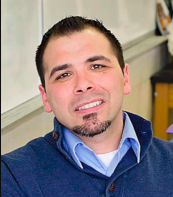
Chris Monsour
Columbian High School, Tiffin, OH
Biography
Chris Monsour has taught all levels of biology, including AP Biology and Anatomy and Physiology, at Columbian High School for the past 21 years. He has served as academic dean for the Center for Talented Youth with Johns Hopkins University, and has worked with the Howard Hughes Medical Institute Biointeractive team.Chris has a B.S. in environmental biology from Heidelberg University and a M.S. in science education from Montana State University.
Chris has been active with NABT for the past 15 years. He has served as a District Director, served on the board of directors and served as the coordinator for the NABT Bio Club program. In terms of AP Bio, Chris has served as a moderator for the AP Bio Facebook page served as a table leader and question leader for the AP Read and currently is on the development committee.
Chris never stops learning. He has participated in four Earth Expedition trips to Trinidad, Namibia, Argentina and Thailand to study conservation issues. In 2007, he was selected for the National Oceanic and Atmospheric Administration’s Teacher at Sea program.
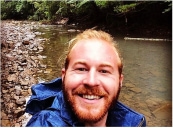
Matthew Holden
Fayetteville High School, Fayetteville, AR
Biography
I grew up in the Arkansas, the natural state, and have always been intrigued by nature and the scientific processes that govern life. My thirst for scientific knowledge and understanding led me to complete a B.S. and M.S. in Biology focusing on ecology, herpetology, and conservation. After graduating, I worked for state environmental conservation and wildlife agencies in Arkansas and Arizona. As I furthered my career, I became more interested in conservation biology, particularly because of the important role conservation plays for future generations. This is what led me to pursue a career in science education and go back to school to complete my M.A.T. It is important for students to understand the basic biological mechanisms that control the regulation of life on Earth because they are the future stewards of Earth. Teaching allows me to prepare the next generation to make informed decisions about the environment and develop the scientific skills to ask questions and investigate the natural world on their own.
Personal Statement
I will begin my 3rd year as a Biology Teacher at Fayetteville High School in Fayetteville, Arkansas in the fall. I have a background in ecology and environmental conservation research and strive to incorporate my research background into my instructional program. My goal as a teacher is to instill a sense of inquiry and thirst for knowledge in my students. To do this, I implement authentic scientific research-based lessons and reveal the sociocultural nature of science and the importance of biology in politics, economics, culture, and students’ everyday lives. The instructional program I have created in my classroom affords me the opportunity to present students with a scientific world view and allows students to gain authentic scientific skills, form scientific inquiries, and become the environmental conservation leaders of the future.
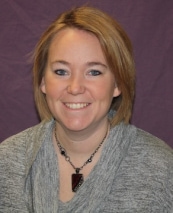
Heather Seitz
Johnson County Community College, Overland Park, KS
Biography
For thirteen years, Dr. Heather Seitz has taught in the community college. Heather currently teaches cell biology, microbiology, and biotechnology in both traditional and online environments. Her educational research focus is on assessment in online learning and engaging non-traditional students in an online classroom. She is dedicated to providing students with course-based undergraduate research experiences through the Tiny Earth Network and the Cell Biology Education Consortium. Heather has led NSF funded projects to increase participation of community college faculty in Discipline Based Education Research and has worked to create a network of life sciences faculty dedicated to equitable and reliable assessment items. Through work with the Quantitative Biology at Community College network, Heather has helped faculty develop curriculum to introduce quantitative skills into life science courses. Through the management of the Microbiology for Health Sciences Concept Inventory (MHSCI) network, Heather has helped faculty deliver this concept inventory. As a PULSE leadership fellow, Dr. Seitz has been involved in numerous projects to effect change in undergraduate life sciences education at the departmental level. She has worked within PULSE’s regional network framework to form communities of practice across institution types to improve life science education. As an editor for the Journal of Microbiology and Biology Education Tips and Tools section she has helped to engage a community of educators in developing best practices that are easy to implement in the classroom. Finally, as a first-generation college student Dr. Seitz is always mindful of the impact educational interventions can have on student success.
Personal Statement
My hope for my students is that they will leave my class not only with the appropriate subject matter knowledge but also with the ability to critically think about new information and communicate and criticize content in the future. I do my best to help convey the passion that I have for biology to my students through authentic research and inquiry. I want each of my students to know how work in the life sciences impacts their everyday lives. One of the most important inclusive teaching practices that I have learned about and try hard to implement is building relationship with my students and facilitating a classroom environment that feels like community.

The National Association of Biology Teachers empowers educators to provide the best possible biology and life science education for all students.
NABT, P.O. Box 335, Heber City, UT 84032
office@nabt.org | Fax: (202) 962-3939
(888) 501-NABT or (703) 264-9696
Thank you for visiting the NABT website.
Our privacy policy is found here.
Announcements for products or services on this website do not imply endorsement of or by NABT.
Website by Morweb.org
Copyright National Association of Biology Teachers
